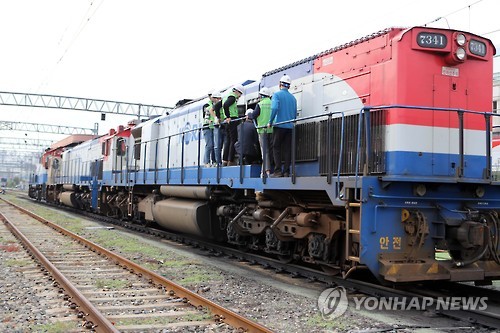- California Assembly OKs highest minimum wage in nation
- S. Korea unveils first graphic cigarette warnings
- US joins with South Korea, Japan in bid to deter North Korea
- LPGA golfer Chun In-gee finally back in action
- S. Korea won’t be top seed in final World Cup qualification round
- US men’s soccer misses 2nd straight Olympics
- US back on track in qualifying with 4-0 win over Guatemala
- High-intensity workout injuries spawn cottage industry
- CDC expands range of Zika mosquitoes into parts of Northeast
- Who knew? ‘The Walking Dead’ is helping families connect
Railroad union agrees to end months-long strike
DAEJEON, Dec. 7 (Yonhap) — Unionized railway workers of South Korea decided to end their some 70 days-long strike Wednesday after they reached an agreement in wage negotiations with management.
The state-run Korea Railroad Corp. (KORAIL) said it concluded a draft deal with its labor union after two days of intensive negotiations. Under the tentative deal, they agreed to decide the laborers’ wages within the boundary of the guidelines provided by the government, according to KORAIL. It declined to give further details.
The KORAIL union launched a joint strike with subway services unions on Sept. 27 in protest of the government’s push for a performance-based pay system. The subway workers ended their strikes within a few days.
The merit pay system is one of the Park Geun-hye administration’s key policies to boost labor flexibility to create more jobs, especially for youth. Labor unions oppose the scheme, worrying that it could be used to allow companies to fire employees more easily and worsen working conditions.
The longest-ever railway strike affected train operations but failed to resonate with the public, as the country has been gripped by an influence-peddling scandal surrounding the president and her confidante.
The labor union said the agreement will be put up for a vote by its members for final approval, adding they will continue with their fight against the merit-based pay system.
“We deeply apologize for causing inconveniences to the public,” a KORAIL official said. “We will turn over a new leaf based on the latest struggle and challenges and focus on securing the railroad safety and normalization of the operation.”
A member of the labor union said the trains are expected to begin operating normally starting this week.









![일본 사도광산 [서경덕 교수 제공. 재판매 및 DB 금지]](http://www.koreatimesus.com/wp-content/uploads/2024/07/PYH2024072610800050400_P4-copy-120x134.jpg)


